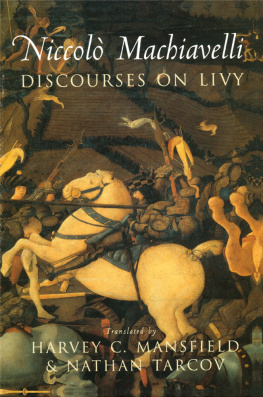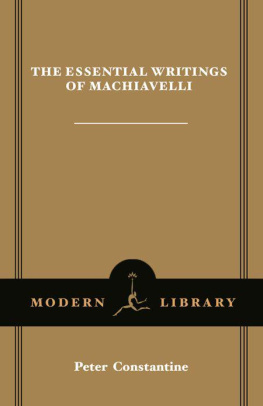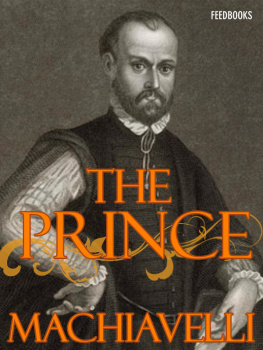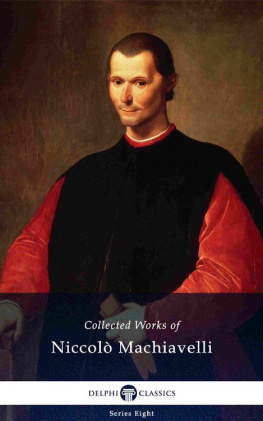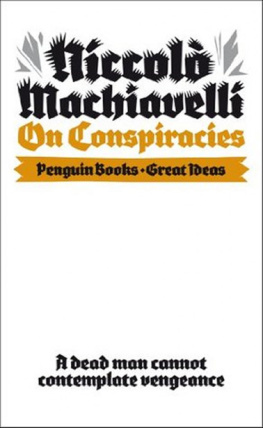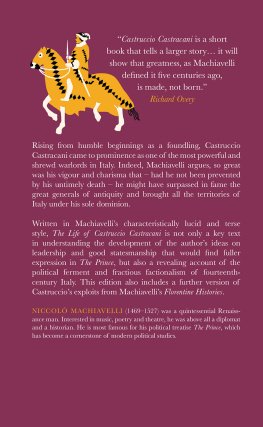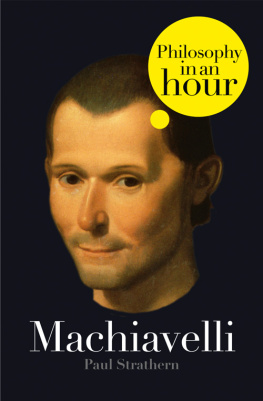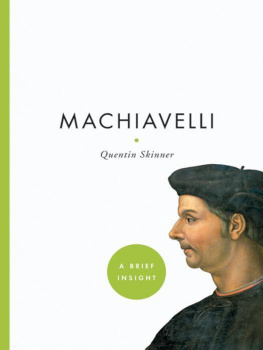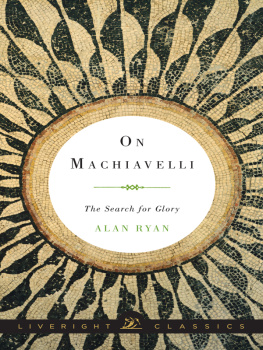Niccolò Machiavelli - Art of War
Here you can read online Niccolò Machiavelli - Art of War full text of the book (entire story) in english for free. Download pdf and epub, get meaning, cover and reviews about this ebook. year: 2003, publisher: University of Chicago, genre: Politics. Description of the work, (preface) as well as reviews are available. Best literature library LitArk.com created for fans of good reading and offers a wide selection of genres:
Romance novel
Science fiction
Adventure
Detective
Science
History
Home and family
Prose
Art
Politics
Computer
Non-fiction
Religion
Business
Children
Humor
Choose a favorite category and find really read worthwhile books. Enjoy immersion in the world of imagination, feel the emotions of the characters or learn something new for yourself, make an fascinating discovery.

- Book:Art of War
- Author:
- Publisher:University of Chicago
- Genre:
- Year:2003
- Rating:3 / 5
- Favourites:Add to favourites
- Your mark:
- 60
- 1
- 2
- 3
- 4
- 5
Art of War: summary, description and annotation
We offer to read an annotation, description, summary or preface (depends on what the author of the book "Art of War" wrote himself). If you haven't found the necessary information about the book — write in the comments, we will try to find it.
Art of War — read online for free the complete book (whole text) full work
Below is the text of the book, divided by pages. System saving the place of the last page read, allows you to conveniently read the book "Art of War" online for free, without having to search again every time where you left off. Put a bookmark, and you can go to the page where you finished reading at any time.
Font size:
Interval:
Bookmark:
ART OF WAR
Niccol Machiavelli
ART OF WAR
Translated, Edited, and with a Commentary by
Christopher Lynch
The University of Chicago Press Chicago and London

To Catherine OLoughlin Lynch
and to our children,
Emily, Henry, and Grace
ABBREVIATIONS

TRANSLATORS PREFACE AND ACKNOWLEDGMENTS
The purpose of this book is to provide English-speaking readers the opportunity to understand the only major prose work Machiavelli published during his lifetimethe Art of War. The books centerpiece is a translation of the Art of War that seeks to be as faithful as possible to the original. The translation is the first to incorporate the many significant discoveries included in the recent critical edition of the Italian, edited by Jean-Jacques Marchand, Denis Fachard, and Giorgio Masi. The new Italian edition reconstitutes the text as it was first published in Florence in 1521 as Libro della arte della guerra di Niccol Machiavegli cittadino et segretario fiorentino. For details regarding this Italian edition and an explanation of the principles that guided the translation, please consult the note on the translation. My introduction and footnotes to the text (as well as the interpretive essay at the back of the book) are merely tools for helping contemporary readers overcome some of the obstacles that lie between them and Machiavellis intention and teaching in the Art of War. If these tools become impediments in turn, I encourage readers to leave them aside and proceed straight to the Art of War itself.
The introduction orients readers to the general character of the Art of War and provides basic information about that works historical context, sources, influence, contemporary relevance, and treatment in the scholarly literature. It is meant to be of use to anyone unfamiliar with the Art of Warin particular or with Machiavellis works more generally. In the interpretive essay, I put forward my own understanding of the Art of Warin light of its military, political, and philosophical or literary aspects.
Many individuals and institutions made possible and improved this book. The translation is much better for the suggestions of Wayne Ambler, Harvey Mansfield, Anne McDonald, Christopher Nadon, Davide Papotti, and Nathan Tarcov. Valuable criticisms of various drafts of the introduction and interpretive essay were made by Stephen Gregory, Edmund Jacobitti, Mark Lutz, Harvey Mans field, Jonathan Marks, David McNeill, Nathan Tarcov, Paul Ulrich, and Paul Yingling. The entire manuscript was much improved by Steven Lenzners corrections, criticisms, and advice. Svetozar Minkov (assisted by Gabriel Pihas, Lydia Mulvaney, and Jason Laine) prepared the word glossary and did an outstanding job tracking down difficult-to-find sources; Paul Eiting prepared the name index. Their work was funded by the John M. Olin Center for Inquiry into the Theory and Practice of Democracy at the University of Chicago. David Bemelmans copyedited the whole with great care. Emily Lynch and Aaron Krager helped with proofreading. Any remaining errors and infelicities are my responsibility.
My interest in Machiavelli and in political philosophy more generally was initially sparked by the charm and intelligence of Henry Higuera at St. Johns College. He later introduced me to Allan Bloom who oversaw my first years of graduate study at the University of Chicago. Unlike any other, Mr. Blooms voice knew how to descend into the netherworld of every soul. At Chicago I was fortunate to have the chance to learn from many talented teachers, including Hillel Fradkin, David Grene, Walter Kaegi, Leon Kass, Ralph Lerner, Clifford Orwin, and, especially, Nathan Tarcov, whose encouragement, guidance, and example have been indispensable. Assistance for graduate studies related to this project was provided by the Olin, Earhart, and Bradley foundations. My greatest debts are to my first teachers, Leland Lynch and Mary Martin.
Support for an important phase of writing and revision was provided by a Bradley Foundation postdoctoral fellowship at Boston Colleges department of political science. Students in my classes on Machiavelli at Boston College and Carthage College have taught me far more than they likely imagine. Insightful criticisms offered by the referees of the University of Chicago Press led to significant improvements in the manuscript. John Tryneskis wise stewardship of the entire process was invaluable. The dedication expresses my most heartfelt thanks.
INTRODUCTION
The importance of war in Niccol Machiavellis life and writings can hardly be overstated. His long career of government service was dominated by his fateful efforts to found a strong military force, one controlled by the republican government in Florence and drawn from its Tuscan dominions. The goal of this enterprise was to free his native land from a debilitating dependence on mercenary and foreign forces. These martial actions were more than matched by the writings that came to outshine them, Machiavellis The Prince and Discourses on Livy. He declares in the former that a prince should have no other object, nor any other thought, nor take anything else as his art but that of war and its orders and discipline; for that is the only art which is of concern to one who commands (P 14). This categorical advice complements what can be called Machiavellis truest truth, proclaimed in the Discourses on Livy: [I]t is more true than any other truth that if where there are men there are no soldiers, it arises through a defect of the prince and not through any other defect, either of the site or of nature (D I 21). The decisive fact about human beings is that at any time and in any place they can be made into soldiers; the most urgent or important task of politics is to make them so and to use them well. No excuse is to be accepted for failing to shape human nature according to the most fundamental necessity, that of war. Machiavellis words and deeds alike thus direct our attention to his Art of War, the only major prose work he published during his life.
As Machiavellis most sustained and detailed treatment of war, the Art of War offers a revealing angle from which to approach his thought as a whole. Indeed, through the Art of War one is witness to:
the birth of modern military thought
a revolution in military affairs at least as radical as our own
Machiavellis critical assessment of the results of his own efforts as Florentine Secretary to give his native city arms of its own
a synthesis of the Western and non-Western ways of war
a host of brilliant battlefield stratagems and ruses
an extended reflection on the enduring elements of civilmilitary relations
an appeal to, and simultaneous attack on, the humanism of his day
the announcement of the authors long-term project for the political and spiritual transformation of the West
In addition to providing such a useful vantage point, the Art of Waris an entre in another sense as well. Because Machiavelli chose to publish it during his life, in Florence in 1521, the work affords the opportunity to see him as he wished to present himself to his contemporaries, namely, as Florences preeminent civilian expert on military affairs. By the time of the posthumous publication of The Prince and Discourses on Livy, Machiavelli was already well known for his military writings as well as for his military projects as Secretary of the Second Chancery of Florence. Over the course of his fourteen-year tenure as secretary, Machiavelli bore the longest sustained responsibility for military matters of any government official. He was immersed in virtually all areas of military affairs: he personally observed and reported to his government on the size, composition, weaponry, morale, and logistical capabilities of the most effective militaries of his day; he created Florences first native fighting force in over one hundred years, writing the law on its composition, handpicking its troops, and vetting its potential captains (as Machiavelli called military leaders); and he planned or observed significant sieges and skirmishes. His proclamation in the preface to the Art of War that he is inexperienced in war because he was not a soldier must therefore be taken with more than a grain of salt, much like his humble disclaimers in the dedicatory letters to The Prince and Discourses on Livy. Machiavelli had intimate familiarity with the warfare of his day as practiced by numerous types of warriors.
Font size:
Interval:
Bookmark:
Similar books «Art of War»
Look at similar books to Art of War. We have selected literature similar in name and meaning in the hope of providing readers with more options to find new, interesting, not yet read works.
Discussion, reviews of the book Art of War and just readers' own opinions. Leave your comments, write what you think about the work, its meaning or the main characters. Specify what exactly you liked and what you didn't like, and why you think so.

